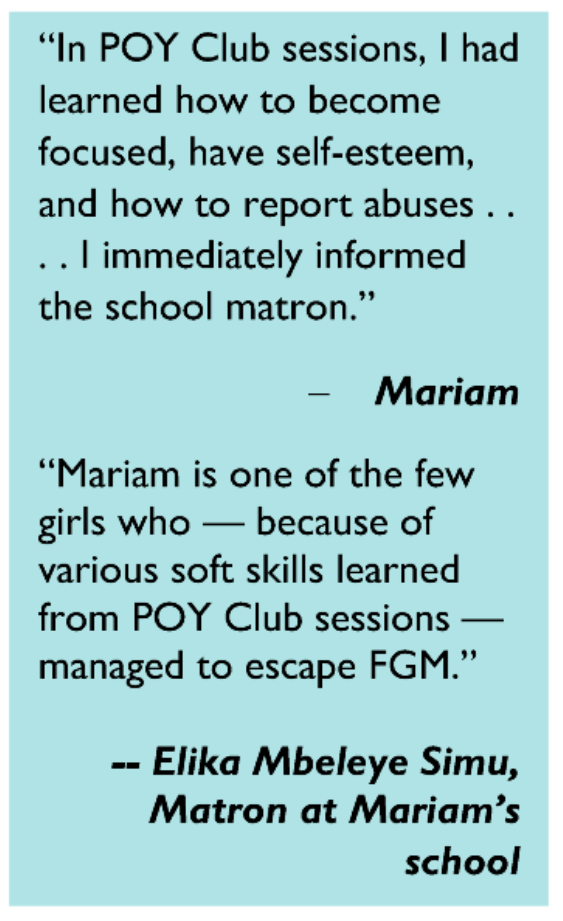POY Club Life Skills Enable Student to Avert FGM
February 8th, 2021 | Stories
February 6 marks the International Day of Zero Tolerance for Female Genital Mutilation (FGM), part of a global effort to end this long standing violation of human rights by 2030. We’d like to introduce you to Mariam — a courageous young secondary school student — to learn how she used skills and knowledge gained through our Waache Wasome “(“Let them Learn”) project to speak up and protect herself from this highly harmful practice.
Among the ethnic groups in Tanzania’s northwestern Tarime District, it is a custom to conduct coming-of-age rituals among adolescents every two years. These rituals commonly include the practice traditionally called “female circumcision” — or what is more accurately termed female genital mutilation (FGM) and internationally recognized as a human rights violation against girls and women. (Note: FGM is prohibited under Tanzania’s 2009 Law of the Child Act, but the practice still continues in areas of the country.)
Last year, 2020, marked the biennial for conducting this ritual among the Kurya tribe — and that’s how Mariam, a Form IV student in her final year of basic secondary school, found herself in a situation that could seriously interrupt her education and threaten her health and well-being.
“When all adolescents in the village were being prepared for the circumcision ritual that involves FGM, my father told me to prepare as well,” Mariam recalls. As an incentive, her father said that if Mariam agreed “without causing ‘trouble,’” he would ensure that she was educated to the highest level she wanted. (In actual fact, after FGM, girls are deemed to be marriageable and often enter into early marriage that further imperils their health and socioeconomic situations.)
“Since I already knew the negative effects of FGM from numerous discussions in POY [Protect Our Youth] Club sessions, I categorically declined,” Mariam says. “Then I held a long discussion with my mother, trying to educate her about the dangers of FGM. She finally gave in and agreed with me.”
However, her father was furious when he learned that Mariam had managed to convince her mother. At this point, Mariam became afraid that her father might employ people to take her by force to be circumcised.
“I then recalled that in POY Club sessions, I had learned how to become focused, have self-esteem, and how to report abuses using appropriate channels,” Mariam explains. “I immediately informed the school matron who linked me with an NGO that supports girls in danger of FGM. They interviewed me and after some discussions with my teachers, offered to pay for hostel accommodation so I could continue with my studies and stay away from the hostile home environment.”
The matron at the school Mariam attends, Elika Mbeleye Simu, says that Mariam is one of the few girls who has managed to escape FGM — because she put into practice the life skills and protective assets she developed through Waache Wasome’s POY Club training.
“The majority of girls in this area are not that lucky,” Ms. Simu says. “They are forced to undergo FGM and then they immediately drop out of school. This is because they become sick for a long time and thus miss classes, or get married immediately because of the illusion that they are now grown women.”
Mariam is one of approximately 10,000 students to date (>50% girls) who have joined Bantwana-supported POY Clubs and attended sessions that empower them with information, skills, and support networks to help navigate the variety of risks they face and build protective assets to reduce vulnerabilities.
Waache Wasome is a six-year project funded by the US Agency for International Development. The initiative aims to reduce school dropout and improve education retention of adolescent girls in formal and alternative educational pathways. Multi-layered inputs are designed to empower girls and young women with social and protective assets to claim their right to safe and equitable education — while also including boys and men in activities that seek to transform gender norms, family dynamics, household economic resilience, and teacher skills and practices. A key intervention in our work with 108 secondary schools is supporting the functioning of student-led Protect Our Youth (POY) clubs that build agency, confidence, and communication skills among both boys and girls.
World Education fosters enduring partnerships across regions and sectors to advance education outcomes for all. We offer education systems strengthening, program design and implementation, applied research and evaluation, capacity development, and policy development services.